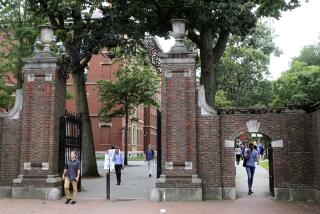‘Publish or Perish’ Code Fares Poorly in Faculty Poll
- Share via
SAN DIEGO — The “publish or perish” dilemma is taking its toll on the nation’s college faculty members, most of whom prefer to spend their time teaching but feel compelled to conduct research to earn promotions and tenure, according to a survey by the Carnegie Foundation for the Advancement of Teaching.
The two-year survey of 5,000 college and university teachers showed that 69% of public school faculty members and 73% of those in private schools said that their “interests lie toward teaching, not research.” A startling 39% of faculty at research institutions--universities whose primary mission is scholarly and scientific research--agreed with the statement.
Frustrations Told
“While research and publication are viewed as the primary route to tenure and promotion, still most faculty say teaching matters most, and still most faculty are frustrated” by the conflict, said Ernest Boyer, president of the Carnegie Foundation.
But despite that situation and salaries deemed “fair or poor” by about 60% of those surveyed, 80% of the faculty members interviewed said they would choose higher education teaching careers again and 60% described themselves as “more enthusiastic” than when they began.
Boyer, who will include the data in his book “College: The Undergraduate Experience in America,” to be published this fall, said the conflict between teaching and research creates a “curious ambivalence that is not healthy for either the institution or the people.”
One effect of the conflict is that teachers simply avoid scholarly research: 33% to 50% of the faculty outside research institutions told the pollsters that they were doing no research.
Students, Boyer said, also recognize when they are being shortchanged: 45% of public university students and 23% of those in private schools said that “most students here are treated like numbers in a book.” The feeling was strongest in research institutions, where 62% agreed with the statement; it was weakest at liberal arts colleges, where only 9% agreed.
Boyer, one of the nation’s leading education experts and author of the acclaimed 1983 study “High School: A Report on Secondary Education in America,” spoke Monday to the annual meeting of the Assn. of Governing Boards of Universities and Colleges. He called on the 27,000 trustees, regents and chancellors who are members of the organization to begin prizing teaching as highly as research.
Criteria for Promotion
The survey showed that 64% of public university teachers and 70% of private school faculty believe that “teaching effectiveness, not publication, should be the primary criteria for promotion.” The statement was supported by 35% of the faculty at research institutions, 83% at liberal arts schools, and 88% at two-year schools.
Boyer and Clark Kerr, president emeritus of the University of California, later conceded that such a teaching evaluation system has been perennially difficult to establish because research papers are tangible, quantifiable evidence of a professor’s performance while teaching skills can only be judged subjectively.
More to Read
Sign up for Essential California
The most important California stories and recommendations in your inbox every morning.
You may occasionally receive promotional content from the Los Angeles Times.










